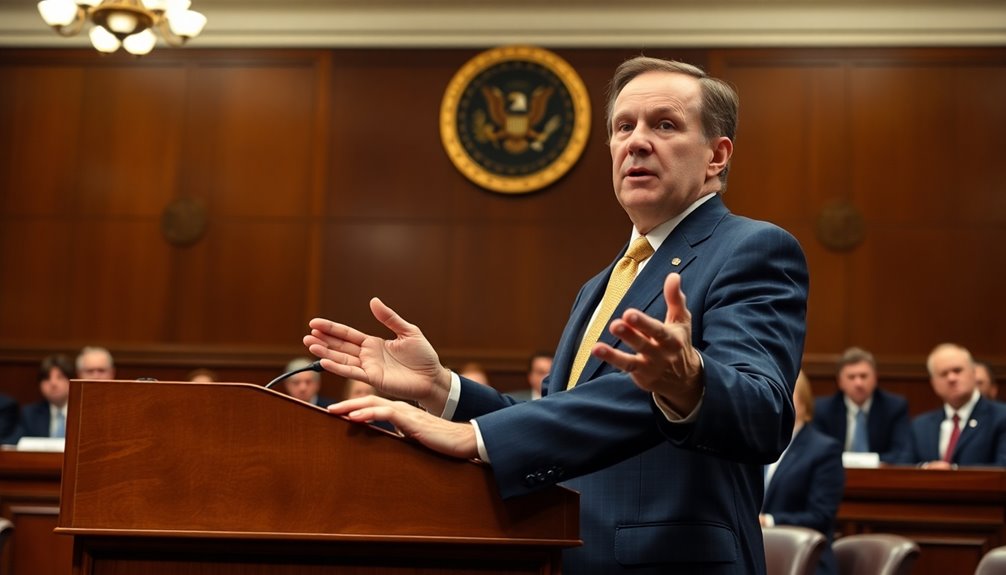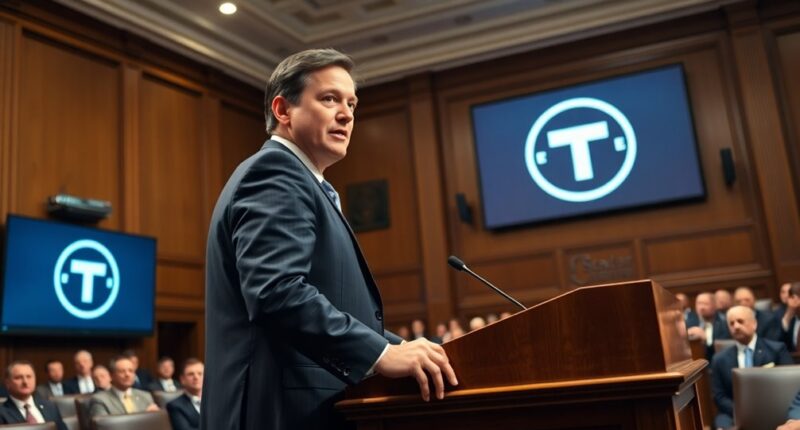In a recent Senate hearing, Howard Lutnick advocated for Tether, underscoring the urgent need for transparency in the stablecoin sector. He pointed out the lack of audits since 2014 as a significant issue. By proposing regular audits and backing Tether with US Treasuries, Lutnick aims to enhance confidence and compliance in the cryptocurrency market. What implications could this have for both investors and regulators alike?

As Howard Lutnick steps into the spotlight amid his nomination for Commerce Secretary, he finds himself defending Tether, often dubbed the "outlaws' favorite cryptocurrency." While Lutnick's company, Cantor Fitzgerald, plays a significant role in managing Tether's assets, concerns about the stablecoin's compliance with regulatory standards loom large.
You might wonder how Lutnick balances his business ties with the ethical implications of Tether's reputation, especially given its association with illicit activities.
During the Senate hearing, Lutnick voiced strong support for stablecoin audits, emphasizing the need for transparency and compliance. You can appreciate his stance: he argues that audits would help clarify Tether's financial standing, which has been murky since 2014. Despite his advocacy, Tether still hasn't completed a financial audit, raising eyebrows among senators skeptical of its operations. Decentralized finance has become a key area of focus in discussions about cryptocurrency regulation.
Lutnick proposed that stablecoins should be backed by US Treasuries to ensure stability, a move that could bolster confidence in Tether and similar assets.
You might find it intriguing that Lutnick believes artificial intelligence could play a pivotal role in monitoring blockchain transactions. He argues that AI can help track and prevent illegal activities, which would address some of the concerns surrounding Tether. He emphasized that AI could also aid authorities in identifying illegal activities in digital assets.
Yet, as senators like Elizabeth Warren expressed skepticism about Lutnick's ties to Tether, the pressure mounted on him to prove his impartiality.
Democratic senators raised questions about potential financial conflicts of interest, given Lutnick's extensive business connections and involvement with Tether. They couldn't overlook Tether's troubling links to illicit financing, including allegations of funding terrorist groups.
Lutnick's business ties to China and other entities only intensified scrutiny, complicating his nomination process. He reassured the committee that he plans to divest from his business interests if confirmed, a promise aimed at alleviating concerns.
As the discussion about the future of stablecoins unfolds, you can see a growing consensus on the need for rigorous audits and regulatory frameworks. Stricter regulations could help curb illicit use of stablecoins while ensuring they're fully backed by reliable assets.
Tether's future hinges on its ability to meet these regulatory demands and complete overdue audits. The implications of stablecoin regulation extend beyond borders, impacting global financial markets and security.
In this high-stakes environment, Lutnick's defense of Tether may shape not only his own future but the broader landscape of cryptocurrency regulation.









